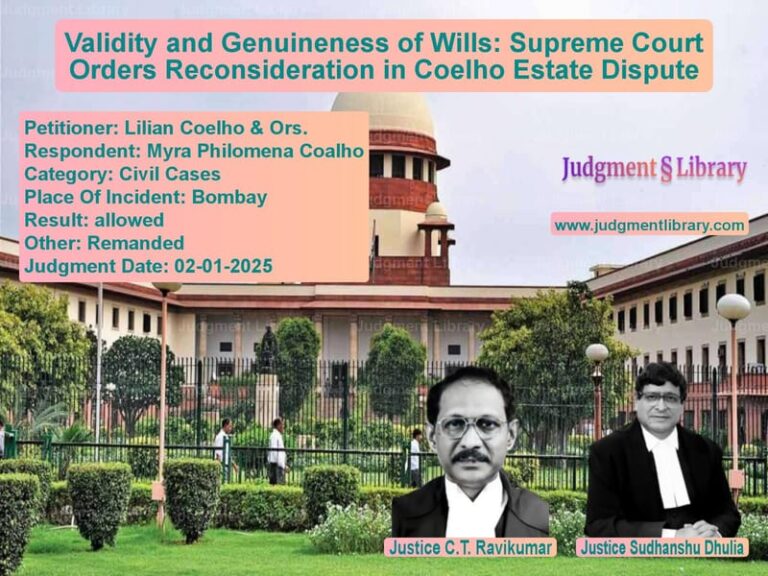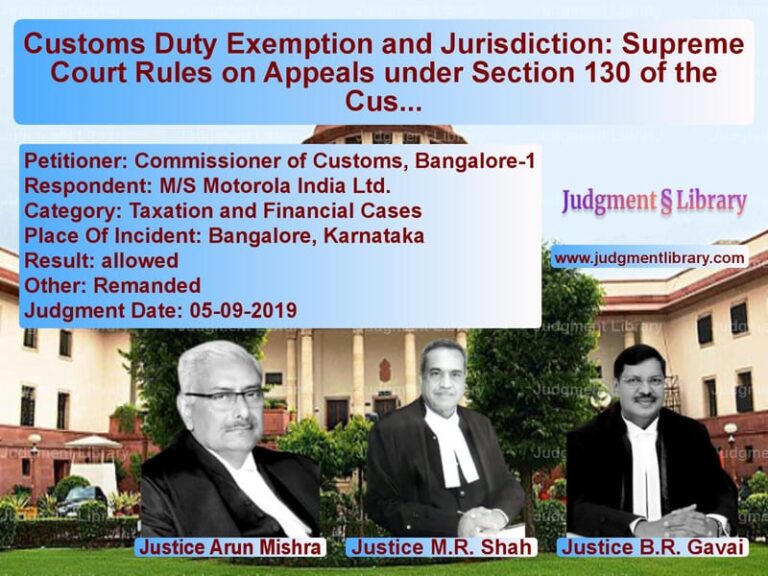Land Acquisition Disputes: Supreme Court Ruling on Compensation and Possession
The Supreme Court of India recently delivered a significant judgment in the case of Delhi Development Authority (DDA) v. Asha Jain & Ors., which dealt with the interpretation of Section 24(2) of the Right to Fair Compensation and Transparency in Land Acquisition, Rehabilitation and Resettlement Act, 2013 (hereinafter referred to as the “Act, 2013”). The key issue in this case was whether the land acquisition proceedings initiated under the Land Acquisition Act, 1894, had lapsed due to non-payment of compensation.
Background of the Case
The dispute arose when the High Court of Delhi, in response to a writ petition filed by the respondent, declared that the acquisition of the disputed land had lapsed under Section 24(2) of the Act, 2013. The High Court relied on the Supreme Court’s earlier judgment in Pune Municipal Corporation & Anr. v. Harakchand Misirimal Solanki & Ors. (2014) 3 SCC 183, where it was held that land acquisition lapses if compensation was neither paid nor deposited in court.
Read also: https://judgmentlibrary.com/supreme-court-remands-property-dispute-for-fresh-consideration/
The Delhi Development Authority (DDA) challenged this decision, contending that the High Court had failed to consider the Supreme Court’s subsequent Constitution Bench ruling in Indore Development Authority v. Manoharlal & Ors. (2020) 8 SCC 129, which overruled the Pune Municipal Corporation case.
Petitioner’s Arguments
The DDA, as the appellant, argued the following points:
- The possession of the land in question was taken over in 2005.
- The High Court erroneously relied on the overruled judgment in Pune Municipal Corporation, which was no longer good law.
- The Constitution Bench in Indore Development Authority clarified that the phrase “paid” in Section 24(2) does not necessarily mean deposit in court, and acquisition does not lapse merely because the compensation was not deposited.
- The original writ petitioner had acquired the land through an Agreement to Sell dated 09.05.2005, which does not confer ownership rights. Thus, she was a subsequent purchaser and had no legal standing to challenge the acquisition.
Respondent’s Arguments
The respondents argued:
- The compensation for the land had not been paid to the landowners, making the acquisition invalid under Section 24(2) of the Act, 2013.
- They relied on the earlier ruling in Pune Municipal Corporation to assert that non-payment of compensation results in the automatic lapse of acquisition.
- Since the land was not put to use for public purposes, the acquisition should be deemed to have lapsed.
Supreme Court’s Observations
The Supreme Court examined the legal precedents and legislative intent behind Section 24(2) of the Act, 2013. The Court reiterated the principles laid down in the Constitution Bench ruling in Indore Development Authority:
- Under Section 24(2), the acquisition only lapses if both possession has not been taken and compensation has not been paid.
- Non-deposit of compensation in court does not mean that the acquisition lapses.
- A subsequent purchaser (who acquired the land after the acquisition process had begun) has no right to challenge the acquisition.
- Once possession is taken under Section 16 of the Land Acquisition Act, 1894, the land vests in the State, and there is no provision for divesting under the Act, 2013.
Supreme Court’s Decision
The Supreme Court ruled in favor of the DDA and held that:
- The High Court’s reliance on the overruled Pune Municipal Corporation judgment was incorrect.
- The acquisition had not lapsed, as possession had been taken in 2005.
- The compensation, even if not paid, did not invalidate the acquisition under the law clarified in Indore Development Authority.
- The respondent, as a subsequent purchaser, had no right to claim lapse of acquisition.
Accordingly, the Supreme Court set aside the High Court’s judgment and dismissed the respondent’s writ petition.
Key Takeaways from the Judgment
This ruling has crucial implications for land acquisition cases:
- Clarification on Section 24(2): The Supreme Court reaffirmed that both possession and compensation criteria must be met for acquisition to lapse.
- Limited Rights of Subsequent Purchasers: Individuals who purchase land after acquisition proceedings have commenced cannot claim lapse of acquisition.
- Finality of Possession: Once land is taken over for public purposes, it vests with the State and cannot be returned due to procedural issues in compensation payment.
Conclusion
The Supreme Court’s judgment in Delhi Development Authority v. Asha Jain & Ors. serves as an authoritative precedent in land acquisition law, reinforcing that procedural lapses in compensation do not automatically invalidate acquisitions. By upholding the principles of Indore Development Authority, the Court has provided clarity on how Section 24(2) should be interpreted and applied, ensuring that public development projects are not unnecessarily hindered by legal ambiguities.
Petitioner Name: Delhi Development Authority.Respondent Name: Asha Jain & Ors..Judgment By: Justice M.R. Shah, Justice M.M. Sundresh.Place Of Incident: Delhi.Judgment Date: 09-11-2022.
Don’t miss out on the full details! Download the complete judgment in PDF format below and gain valuable insights instantly!
Download Judgment: delhi-development-au-vs-asha-jain-&-ors.-supreme-court-of-india-judgment-dated-09-11-2022.pdf
Directly Download Judgment: Directly download this Judgment
See all petitions in Property Disputes
See all petitions in Landlord-Tenant Disputes
See all petitions in Specific Performance
See all petitions in Damages and Compensation
See all petitions in Judgment by Mukeshkumar Rasikbhai Shah
See all petitions in Judgment by M.M. Sundresh
See all petitions in allowed
See all petitions in Quashed
See all petitions in supreme court of India judgments November 2022
See all petitions in 2022 judgments
See all posts in Civil Cases Category
See all allowed petitions in Civil Cases Category
See all Dismissed petitions in Civil Cases Category
See all partially allowed petitions in Civil Cases Category







